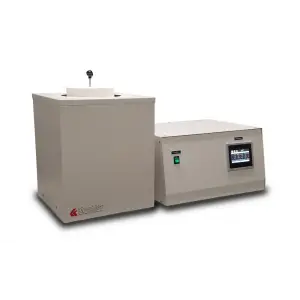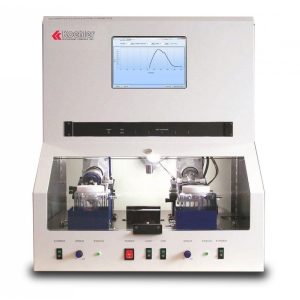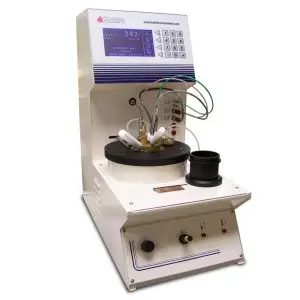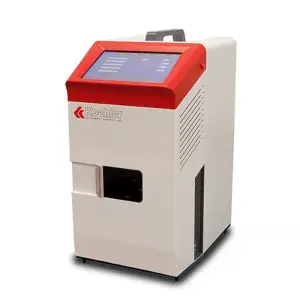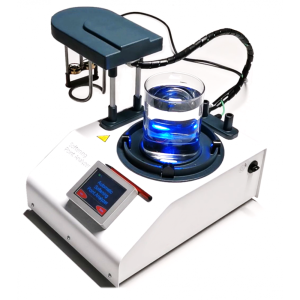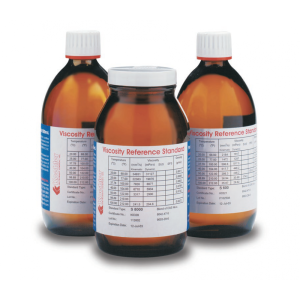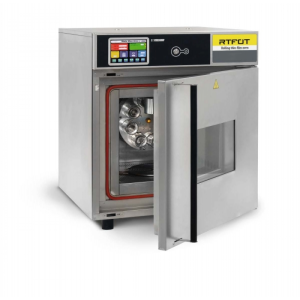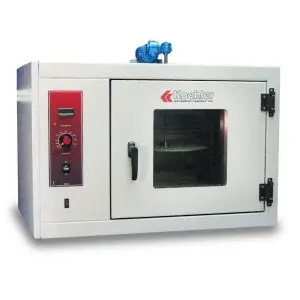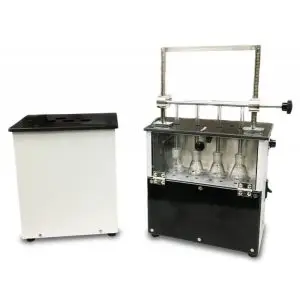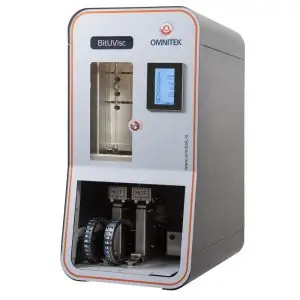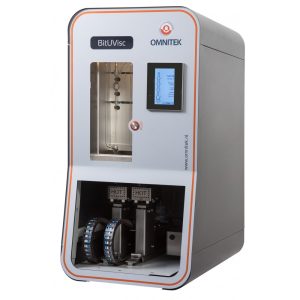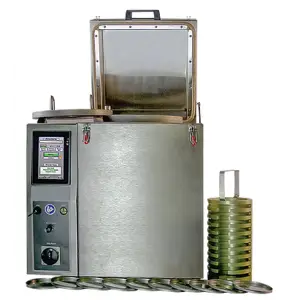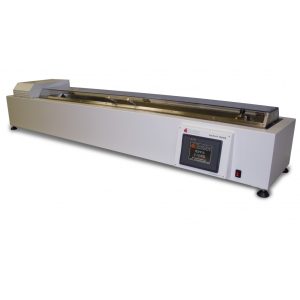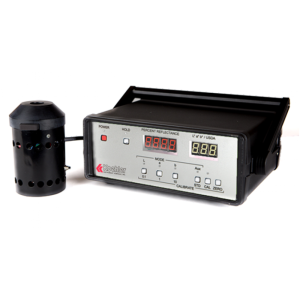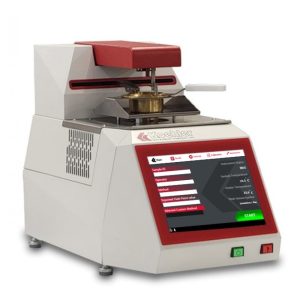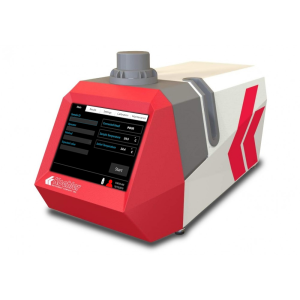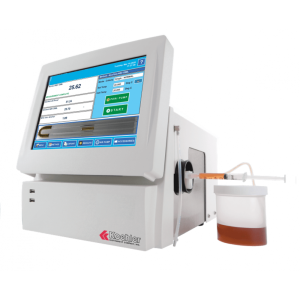Shop
Showing 1–16 of 31 results
-
Autoignition Apparatus
$6,000.00Modified crucible furnace with digital thermocouple readout of flask temperature at prescribed points per ASTM specifications. Furnace provides rapid response and ±1°C stability throughout the operating range from ambient to 1200°C. The cylindrical heating chamber provides excellent radial temperature uniformity. The furnace cover has ports for flask exterior thermocouples, and a borosilicate glass thermocouple tube is provided to assure correct positioning of the gas temperature thermocouple inside the test flask. Thermocouples plug directly into the furnace control unit for quick disconnection when removing the flask. A hinged holder in the cover facilitates handling of the test flask. An adjustable mirror permits safe viewing of the flask interior during testing. The touch screen control panel has temperature controls and digital thermocouple readout with all temperatures displayed on a single screen.
-
Automated Flocculation Titrimeter
$13,000.00The Automated Flocculation Titrimeter (AFT) is a highly automated, computerized instrument that acquires oil stability and compatibility parameters directly. The AFT can be used to perform ASTM D6703 test method for Automated Heithaus Titrimetry. The instrument operates as a closed system with accurately controlled temperatures between 20-100°C, important for properly determining Heithaus compatibility parameters. The flocculation point is determined spectroscopically and the results are analyzed by the data acquisition system, virtually eliminating operator error in the interpretation of endpoints. A key benefit to the user is the fact that the asphaltene concentration can be calculated by the software much faster than traditional methods and with more accuracy. The utility of the original Heithaus method has been expanded by developing multiple titration schemes. The software uses the data from the expanded method to predict the proximity to coke formation during heavy oil distillation. Many refiners stop distillation short of coke formation to avoid fouling in distillation equipment, tanks and transfer lines. The expanded AFT methodology allows the refiner to recover additional distillate without the fear of fouling. This attribute of the instrument should allow up to a 1-2% increase in yields if applied to a process. Conversely, the added benefit of being able to predict coking tendency would prevent fouling of the process and thus decrease the use of energy in production as well as reduce down time due to having to clean vessels after fouling. One of the primary uses of Heithaus values is to predict the compatibility (P Index) of which oils and petroleum residua or asphalts can be mixed together for shipping, processing, or in formulations without causing phase separation. This is valuable to the refiner, researcher, or asphalt jobber who supplies petroleum asphalts for highway and roofing applications because it ensures that compatible asphalt blends are supplied. Incompatible asphalts show early failure in both applications. Coking Index (US Patent 6,773,921)-Stability also influences coke formation in the refining process. Another major use for the AFT is to acquire the data needed to employ the Coking Index. The Coking Index is a quantitative measure of the proximity to coking (fouling) during visbreaking, distillation, transfer and storage of heavy oil. This allows the petroleum refiner to optimize heavy oil processing and to recover the maximum amount of distillate, and to stop the processing before fouling occurs. Solubility Parameter-The solubility parameter at which asphaltenes begin to precipitate and the solubility parameter of the whole oil can be calculated from the AFT data.
-
Automatic Abel Flash Point Tester
$6,000.00The Automatic Abel Flash Point Tester is used primarily to test flammable and combustible materials for shipping and safety regulations. The flash tester provides an increased temperature range of operation as compared with other testers, allowing greater flexibility in testing samples according to the Abel test method. The unit provides a test range to 110°C and can be extended to –30°C by any appropriate external chiller. The flash point tests are simply conducted by mounting the flash cup filled with sample into the test position and selecting a pre- or user-programmed test method. Automation routines provide accurate test results. A quick search method is available to determine the flash point of unknown samples. The dual detection system (thermal and ionization) allows for testing all types of products. Ignition by gas flame or electrical ignitor is included, along with safety cut-off devices. Test results are automatically corrected to standard pressure (101.3 kPa). The system is equipped with a differential Pt-100 RTD probe designed to duplicate the response time of a mercury-in-glass thermometer and with multiple sensors that continually monitor instrument function, displaying an error message if a problem is detected. Supervision software is included.
-
Automatic Microscale Continuously Closed Cup Flash Point Analyzer
$9,000.00The Automatic Abel Flash Point Tester is used primarily to test flammable and combustible materials for shipping and safety regulations. The flash tester provides an increased temperature range of operation as compared with other testers, allowing greater flexibility in testing samples according to the Abel test method. The unit provides a test range to 110°C and can be extended to –30°C by any appropriate external chiller. The flash point tests are simply conducted by mounting the flash cup filled with sample into the test position and selecting a pre- or user-programmed test method. Automation routines provide accurate test results. A quick search method is available to determine the flash point of unknown samples. The dual detection system (thermal and ionization) allows for testing all types of products. Ignition by gas flame or electrical ignitor is included, along with safety cut-off devices. Test results are automatically corrected to standard pressure (101.3 kPa). The system is equipped with a differential Pt-100 RTD probe designed to duplicate the response time of a mercury-in-glass thermometer and with multiple sensors that continually monitor instrument function, displaying an error message if a problem is detected. Supervision software is included.
-
Automatic Softening Point of Bitumen
$5,000.00Determines the softening point of bitumen in the range from 30 to 157°C (86 to 315°F) using the ring and ball apparatus immersed in distilled water (30 to 80°C), USP glycerin (above 80 to 157°C), or ethylene glycol (30 to 110°C).
-
Certified Petroleum Reference Standards
$2,000.00- Manufactured and certified for ASTM and related test procedures
- NIST traceable standards developed utilizing ASTM Round Robin trials
- Custom standards available
Glenkore offers an extensive range of certified petroleum reference materials (CRMs) meeting the analytical requirements for ASTM, ISO, EPA, and related test methods, and are traceable to National Institute of Standards and Technology.
Complete certification is provided with each standard. Refer to the list below for the reference standard that you require or contact us to discuss your needs for a special standard. Detailed datasheets and quotations for standards listed below or for specially prepared standards are readily available from Koehler by contacting our Customer Service Department. We will respond to you promptly upon receiving your request.
-
Loss on Heat / Rolling Thin Film Oven
$17,000.00Double-walled electrically heated convection oven for rolling thin film oven tests on asphalts. Incorporates all required features per ASTM specifications, including: door with double-pane viewing window; symmetrical top and bottom vents; air plenum; squirrel cage-type 1725 rpm fan; digital indicating thermostat to control oven temperature at 163°C ±0.5°C; vertical circular carriage to mechanically rotate the samples at 15±0.2 rpm; air jets to blow heated air into each sample bottle at its lowest point of travel; and a calibrated flowmeter to control air flow at 4000 mL/min. An over-temperature cut-off circuit disconnects power to the unit in the event of control failure.
-
Loss on Heat / Thin Film Oven
$14,000.00Asphalt Oven
Dual purpose oven for loss of heat test and thin film test for bitumen and asphaltic materials. Interior chamber of stainless steel and stored powder painter steel exterior. Double glazed window in door for viewing test chamber. Side mounted controls comprise microprocessor digital control, independent overheat thermostat, main switch and indicator lamps. Two rotating platforms supplied to perform both tests.
-
Oil-Solvent Extractables Content Apparatus
$7,000.00Determines oil content or solvent extractables content in petroleum waxes in accordance with ASTM specifications. Includes Filter Stick Assembly; Cooling Bath; Air Pressure Regulator; and Evaporation Cabinet.
Filter Stick and Assembly – Filters petroleum wax samples per ASTM specifications. Consists of 10mm diameter sintered glass filter stick with air pressure inlet tube and delivery nozzle and a 25x170mm test tube. Inserts in Cooling Bath.
Cooling Bath – Accommodates three (3) 25x170mm test tubes for cooling samples and filter stick assemblies. Insulated stainless steel tank with finished steel exterior. Removable composition top plate has thermometer port, filling port and three 25.4mm (1″) test tube ports. Fill tank with suitable cooling mixture.
Air Pressure Regulator – Controls air flow to the filter stick assembly at the required rate. Mercury bubbler-type, with 250mL glass cylinder, T-tube and rubber stopper.
Evaporation Cabinet – Thermostatically heated cabinet evaporates solvent from filtrate per specifications. Accommodates four weighing bottles. Delivers air stream vertically downward into bottles through glass jets. Manifold assembly is adjustable for positioning of jets at the correct height above the sample surface. Controls temperature at 35 ±1°C (95 ±2°F). Finished steel cabinet with composition front plate and hinged glass door.
-
Omnitek BitU-Visc Automatic Viscometry System
$9,000.00The Omnitek BitU-Visc is a programmable, fully automatic kinematic viscometer specially designed to handle highly viscous samples at high temperatures. The system can process samples with viscosities ranging up to 120,000 mm2/s, up to 150 C.
There are 2 different models available: BitU-Visc 110 features a single thermostatic bath with 1 viscometer tube whereas the BitU-Visc 120 model holds 2 viscometer tubes in a single bath. All BitU-Visc instruments are equipped with auto-sampling, preheating, fully automatic dual solvent cleaning and drying.
The viscometer tubes are based on the well-known and proven Ubbelohde design. Using specially designed thermal sensors, these tubes allow the detection of fully opaque fluids without any problems or limitations and eliminate the need to use reverse flow tubes. The standard configuration offers viscosity measurement up to 150 C and sample preheating up to 200 C.
Sophisticated temperature control ensures that measurements are carried out well within the required temperature stability. The system features an innovative single position auto-sampling which provides integrated heating of the sample up to 200 C and uses preheated solvent to effectively clean the viscometer tube. The BitU-Visc is fitted with specially designed duplo viscometer tubes for unstable samples such as vacuum residues, additives, crude oils, waxes, heavy fuels oils, polymers, asphalts, etc., which typically show poor determinability when sampled repeatedly. These tubes have 2 measuring sections with an approximately similar tube constant. This allows for an actual duplo determination while only sampling once.
The BitU-Visc requires a PC (not included) for full operation and can be controlled through an advanced PC software application but it can also be controlled as a stand-alone unit through the responsive color touchscreen interface with a storage up to 10,000 measurement results. The PC software allows the operator to specify optimized and fully customizable test methods for each individual sample. For data collection, storage, calculations, and reporting, an advanced PC application is provided with the instrument, which can gather data from up to 4 instruments simultaneously.
The BitU-Visc utilizes advanced and easy to use multilingual software. One PC can control multiple systems (1 COM-port required for each instrument). Data can be exchanged with a LIMS via RS232 or via wireless. The instrument can be operated in its entirety through the PC interface. Sample ID’s can be loaded and sample queues can be started, halted or temporarily suspended. Results are automatically stored in the internal database and also can be stored on any external drive or network folder.
During a run, several kinds of information are shown like measured flow times (average and corrected), percent difference, viscosity result, bath temperature, set temperature, preheater temperature, sample ID, test method, measuring section and last results. Also, actual status like filling, cleaning, etc., is shown for every unit involved. Measured flow times are presented in left or right column, depending on whether the upper or lower measuring bulb is used for testing.
-
Pressure Aging Vessel
$13,000.00The Pressure Aging Vessel (PAV) is used to simulate in-service oxidative aging of asphalt binder according to procedures developed by the Strategic Highway Research Program (SHRP). The K88100 is fully compliant with the most recent ASTM and AASHTO standards for these tests. The complete PAV system consists of an ASME-code stainless steel pressure vessel in a stainless steel cabinet with encased band heaters, a precision sample holder for simultaneous testing of ten specimens, a set of ten TFOT specimen trays, a pressure controller, temperature controller, pressure and temperature measurement devices, temperature recorder, and a specimen loading and unloading tool. The K88100 PAV takes the hassle out of running and documenting asphalt binder aging operations. Three easy, non-complicated steps produce accurate and reliable results. Just press the “heat” button, insert specimens when prompted and press the “Age” button and let the PAV do the rest. Custom status screens guide the user step-by-step through the entire process. Each display screen (preheat start-up, preheat ready, aging heat up, aging pressurized, and aging complete) is simple and direct, with detailed process and status information. The final output screen, when the test is complete, shows the current vessel pressure, as well as minimum and maximum temperatures achieved during the test procedure. Process data (temperature and pressure) is continually stored at regular intervals in the programmable logic controller (PLC) that controls and monitors the process. The K88100 features a compact, bench-top design with integral pressure vessel. Its rotating vessel lid with rounded support block provides easy opening and closing. A built-in timer accumulates and records out-of-range time (out-of-range time for the PAV is typically less than 10 minutes during a 20-hour test). Minimum and maximum temperature data is recorded and is displayed at the end of each test.
-
Semi-Automatic Ductility Testing Machine
$2,000.00The Semi-Automatic Ductility Testing Machine is designed explicitly for testing the ductility and elastic recovery of bituminous materials. It features a 6” LCD touch screen control panel. This integrated touch screen allows the user to choose between the ductility or recovery test methods. The custom menu allows for the input of desired speed and time parameters. During testing, the distance traveled by the specimen is displayed and a simple touch of the screen can record the distance traveled upon breakage of the briquet. A motor jogging feature permits locking of the sample carriage without additional movement after the briquet sample is loaded into the machine.
-
Advanced Technology Reflectance Unit
$3,000.00The K30700 is easy to use and contains state-of-the-art electronics. To measure reflectance ratiometrically, two calibration points are required. The instrument uses a black cavity standard and a standard plaque. The black cavity standard is designed to have nearly zero reflectance and the standard plaques are calibrated to a traceable national standard with a known reflectance. The first calibration point is referred to as the “dark” or “zero” offset. When a plaque of known diffuse reflectance is placed on the search unit, it produces a voltage in the photosensor array proportional to the light reflected from the plaque. This provides the second or “reference point” of the calibration
-
Hot
Automatic Cleveland Open Cup Flash Point Tester
$11,000.00The Automatic Cleveland Open Cup Flash Point Analyzer is the
latest addition to the Flash Tester family of products.
This unit is robustly designed using state-of-the-art technology to
allow for seamless testing in accordance with ASTM procedure.
The system software runs on an integrated processor PC running
the latest Windows operating system. The 10.4” touch screen
interface fully displays all operator parameters and results on a
single screen. Data results can be stored on the local hard drive.
An integrated Dual Fan System directly cools the test cup and the
environment around the cup. -
Hot
Automatic Cloud and Pour Point Analyzer
$7,000.00The Automatic Cloud and Pour Point Analyzer is a state of the art piece of equipment for measuring cloud point by optical detection and pour point with automatic tilt. The cloud point is an index of the lowest temperature of a petroleum product or a biodiesel fuel’s utility for certain applications. Wax crystals of sufficient quantity can plug filters used in some fuel systems. The pour point of a petroleum product is an index of the lowest temperature of its utility for certain applications. Flow characteristics, such as pour point, can be critical for the correct operation of lubricating oil systems, fuel systems, and petroleum blending and pipeline operations.
-
Hot
Automatic Density Meter
$5,000.00Density is a fundamental physical property that can be used in conjunction with other properties to characterize the quality of crude oils, light and heavy fractions of petroleum and petroleum products. The test method covers the determination of the density or relative density of crude oils, petroleum distillates and viscous oils that can be handled in a normal fashion as liquids at test temperatures between 15 and 35°C.

